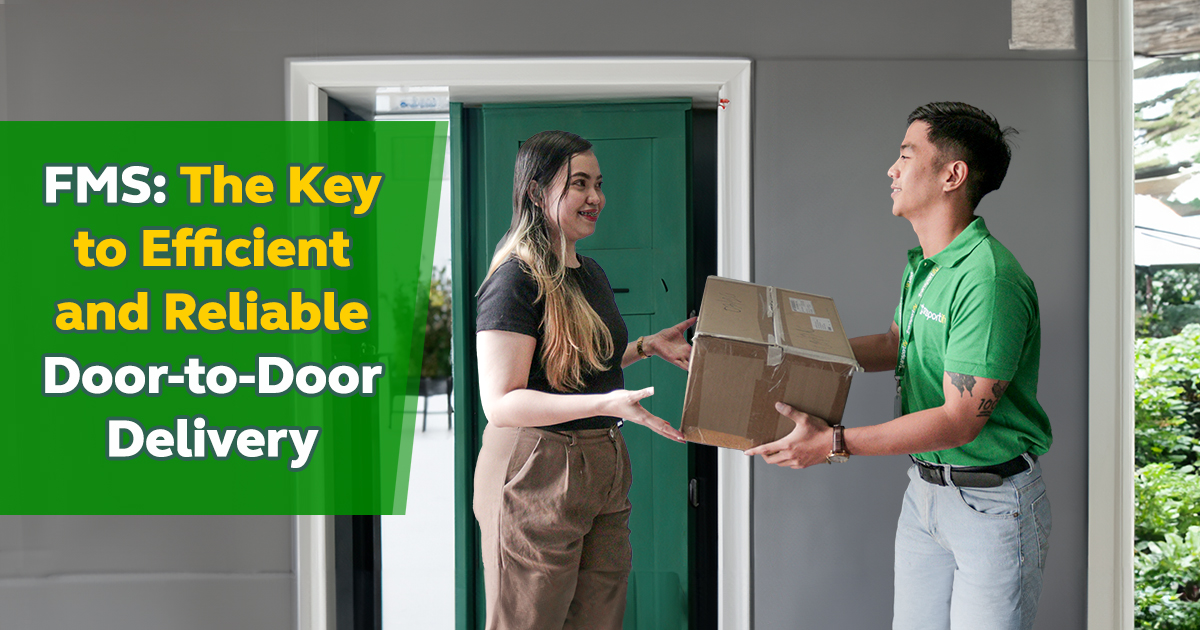
In an era of rapid technological advancement and ever-increasing consumer expectations, door to door delivery services have become a lifeline for businesses and individuals. From essential groceries to the latest gadgets, we rely on these services for convenience and reliability. However, behind the scenes of these seamless deliveries lies a sophisticated technological marvel—the Freight Management System (FMS).
In recent years, door to door delivery services have gained unprecedented prominence. With the advent of e-commerce and the shift towards online shopping, businesses have had to reevaluate their logistics strategies. This shift has elevated the role of Freight Management Systems (FMS) to the forefront of modern logistics. A study by the Council of Supply Chain Management Professionals (CSCMP) found that businesses can save an average of 5% on their transportation costs by using a Transportation Management System or FMS. It is usually to optimize delivery within 24 hours and resource allocation. The study also found that TMS or FMS users can reduce shipping errors by up to 20%.
The Fundamental Function of FMS in Door to Door Delivery
At its core, FMS delivery or Freight Management System is a comprehensive software solution designed to orchestrate the entire logistics process. It functions as the digital brain that manages every aspect, from when an order is placed to when a package reaches its destination. FMS encompasses tools and functionalities carefully crafted to optimize each journey step.
Consider the logistics process as a complex orchestra with various instruments and players. FMS steps in as the conductor, ensuring that each component harmonizes perfectly. It not only streamlines operations but also provides a level of precision that is difficult to achieve manually.
Enhancing Efficiency Through FMS
One of the standout features of FMS is its ability to enhance efficiency throughout the door to door delivery process. Here are some key ways it accomplishes this:
Dynamic Route Optimization
FMS leverages real-time data and sophisticated algorithms to optimize delivery in the Philippines dynamically. Factors such as traffic conditions, weather, and package volume are considered. It ensures the most efficient use of resources and minimizes delivery times.
Resource Allocation
FMS plays a pivotal role in resource allocation. It assigns suitable vehicles and personnel to specific deliveries, preventing overallocation or underutilization of assets. This optimization leads to significant cost savings.
Real-Time Tracking and Updates
Both customers and delivery personnel benefit from real-time tracking and updates facilitated by FMS. Customers can track the status of their deliveries, while drivers receive route adjustments and cargo delivery services instructions on the go. This monitoring will reduce the likelihood of delays and enhance the overall customer experience.
Transportify: A Leading Provider in Door to Door FMS
Among the key players in the FMS landscape for door to door delivery, Transportify stands out as a leading provider. This innovative logistics service provider specializes in door to door deliveries and has integrated advanced FMS technology into its operations.
Transportify offers a seamless and cost-effective solution for businesses looking to optimize their door to door logistics. Their FMS technology allows for efficient route planning, real-time tracking, and dynamic adjustments to delivery schedules. It not only ensures on-time deliveries but also contributes to significant cost savings. The list below are the business program services that make Transportify a leading provider of door to door delivery:
 |
Moreover, Transportify places a strong emphasis on customer satisfaction. Their commitment to accurate and reliable door to door services has made them a preferred choice for businesses and consumers. By leveraging FMS technology, they have elevated the industry’s efficiency and accuracy standards.
Resource Allocation and Optimization
Efficient resource allocation is crucial in the world of door to door delivery services. FMS simplifies this process in several ways:
Vehicle Selection
FMS can analyze the size and weight of each shipment and match it to the most suitable vehicle in the fleet. It prevents the unnecessary use of larger vehicles and optimizes fuel consumption.
Personnel Assignment
FMS assigns drivers and delivery personnel based on location, availability, and expertise. It ensures that each delivery is handled by the most qualified personnel, reducing the likelihood of errors.
Inventory Management
Besides personnel and vehicles, FMS also plays a crucial role in inventory management. It can track inventory levels in real-time and automatically reorder products when they run low. It prevents stockouts and ensures that products are readily available for delivery.
Real-Time Tracking and Customer Experience
In the age of instant gratification, customer satisfaction is paramount in the world of door to door delivery. FMS significantly enhances the customer experience by providing:
- Real-Time Visibility: Customers can track the progress of their deliveries in real-time. This transparency provides peace of mind and eliminates the need for constant inquiries.
- Accuracy and Reliability: FMS minimizes the risk of errors in order processing, leading to accurate deliveries. Customers can trust that the right products will reach them on time and in perfect condition.
- Timely Updates: Delivery personnel receive real-time updates and route adjustments through FMS, ensuring they stay on schedule. This level of communication helps prevent delays and allows customers to plan their day more effectively.
Cost Savings and Environmental Impact
Efficiency doesn’t just lead to better service; it also results in cost savings. FMS contributes to cost reduction in several ways:
- Route Optimization: FMS optimizes delivery routes to minimize fuel consumption, reduce vehicle wear and tear, and decrease door to door deliveries’ environmental footprint. It not only saves money but also aligns with sustainability goals.
- Inventory Control: FMS helps businesses reduce inventory holding costs by preventing stockouts and overstocking. It ensures that capital is kept in excess inventory, improving financial efficiency.
- Resource Efficiency: The optimized allocation of resources, including personnel and vehicles, reduces operational costs. Businesses can operate more leanly, ultimately improving profitability.
Scalability and Adaptability
FMS is designed to accommodate businesses of varying sizes in the door to door delivery sector. Whether a small startup or a large enterprise, FMS can adapt to your needs as your business grows. Its scalability is a crucial factor that allows companies to expand their operations without worrying about the limitations of their logistics systems.
SEE ALSO
Data Analytics and Decision-Making
In today’s data-driven world, information is power. FMS provides a wealth of data analytics and insights that drive informed decision-making in door to door logistics. Some key aspects include:
Demand Forecasting
FMS can analyze historical data and market trends to predict future demand accurately. It enables businesses to plan for peak seasons and allocate resources effectively.
Performance Metrics
Key performance metrics, such as delivery times, vehicle utilization rates, and inventory turnover, can be monitored through FMS. Businesses can use this data to identify areas for improvement and optimize their operations continuously.
Customer Insights
FMS captures valuable customer data that can be used to understand preferences, track buying behavior, and tailor services to meet specific customer needs. It leads to higher customer satisfaction and loyalty.
Compliance and Regulations
The door to door delivery sector is subject to various compliance and regulatory requirements, especially in cross-border or international scenarios. FMS plays a vital role in managing these aspects, including:
- Legal Compliance: FMS helps businesses adhere to legal requirements and regulations governing the transportation of goods. It ensures that shipments comply with customs and trade laws, minimizing the risk of fines or delays.
- Safety and Security: FMS enhances safety and security measures by tracking the movement of goods and ensuring their integrity throughout the delivery process. It is substantial for sensitive or high-value shipments.
- Traceability: FMS offers complete traceability, allowing businesses to monitor the movement of goods in real-time. This traceability enhances accountability and transparency, benefiting both businesses and customers.
Conclusion
The fundamental role of FMS in optimizing door to door delivery services cannot be overstated. It is the driving force behind efficient, accurate, and cost-effective logistics operations. With innovative companies like Transportify leading the way, the future of door to door delivery promises to be faster, wiser, and more environmentally friendly than ever before.
In this fast-evolving landscape, FMS will continue to play a central role in shaping the logistics industry. Its ability to enhance efficiency, reduce costs, improve the customer experience, and address environmental concerns positions it as a cornerstone of modern logistics. As businesses embrace the potential of FMS, we can anticipate further innovations that will revolutionize the world of door to door delivery.
Stay tuned for future articles where we will delve deeper into various aspects of FMS, including its technological underpinnings, route optimization capabilities, inventory management functions, and its role in compliance and regulations. The world of logistics is evolving, and FMS is at the forefront of this exciting transformation.
 | or |




 INSTANT QUOTE
INSTANT QUOTE

 Chat
Chat